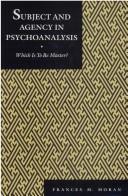| Listing 1 - 3 of 3 |
Sort by
|

ISBN: 081476326X 0585335915 9780585335919 0814754821 9780814754825 9780814763261 Year: 1993 Publisher: New York, NY : New York University Press,
Abstract | Keywords | Export | Availability | Bookmark
 Loading...
Loading...Choose an application
- Reference Manager
- EndNote
- RefWorks (Direct export to RefWorks)
Psychoanalysis works with words, words spoken by a subject who asks that the analyst listen. This is the belief that underlies Francis Moran's rewarding exploration of a central problem in psychoanalytic theory-namely, the separation of the concepts of subject and agency. Subject and Agency in Psychoanalysis contends that Freud simultaneously employs two frameworks for explaining agency-- one clinical and one theoretical. As a result, Freud's exploration of agency proceeds from two logically incompatible assumptions. The division between these assumptions is a part of Freud's psychoanalytic legacy. Moran reads the Freudian inheritance in light of this division, showing how Klein and Hartmann's theoretical concepts of subject are adrift from the subject who speaks in analysis. Moran also shows that while Lacan's subject provides more focus on this issue, Lacan reverts to the Freudian division in his use of logically contradictory assumptions concerning the location of agency. Drawing on contemporary theory development, from Lacanian innovations to the social theories of Anthony Giddens, Moran proposes a new and fertile approach to a fundamental problem, significantly narrowing the gap between psychoanalytic theory and practice.
Self Concept. --- Psychoanalytic Theory. --- Will --- Self --- Psychoanalysis --- Cetanā --- Conation --- Volition --- Ethics --- Philosophy --- Psychology --- Personal identity --- Consciousness --- Individuality --- Mind and body --- Personality --- Thought and thinking --- Psychology, Pathological --- Psychoanalytical Theory --- Theory, Psychoanalytic --- Oral Character --- Character, Oral --- Characters, Oral --- Oral Characters --- Psychoanalytic Theories --- Psychoanalytical Theories --- Theories, Psychoanalytic --- Theories, Psychoanalytical --- Theory, Psychoanalytical --- Self Confidence --- Self-Perception --- Self Esteem --- Self Perception --- Concept, Self --- Confidence, Self --- Esteem, Self --- Perception, Self --- Perceptions, Self --- Self Esteems --- Self Perceptions --- Self-Perceptions --- Personal Autonomy --- History. --- Freud, Sigmund, --- Freud, Sigmund
Book
ISBN: 0429921667 0429907435 0429482663 1282780069 9786612780066 1849407681 9781849407687 9781855757257 1855757257 Year: 2010 Publisher: London : Karnac,
Abstract | Keywords | Export | Availability | Bookmark
 Loading...
Loading...Choose an application
- Reference Manager
- EndNote
- RefWorks (Direct export to RefWorks)
"By way of a new reading of The Complete Works of Sigmund Freud, this book introduces the notion of a theory of practice to the psychoanalytic endeavour. Spelled out in terms of interdependent components, namely; aim, technique and theoretical premises, the author takes the reader through Freud's oeuvre so that he emerges as a relentless, theoretically grounded, practitioner. Frances Moran argues that the nub of the Freudian inheritance is the concept of human subjectivity. In the light of this finding and her reading of Freud, she presents the work of Paul Verhaeghe (On Being Normal and Other Disorders), anew and calls on Marie Cardinal, (The Words to Say It), to provide telling evidence of what it means to be a freudian subject. Given the objectifying processes at work in the contemporary culture, the relevance of Freud for our times becomes compelling. Here practitioners will find a clearly presented framework within which to operate and a way of organizing the material that informs their clinical pursuits. The exploration of an underpinning structure to the Complete Works will be of the utmost assistance to those who wish to embark upon a search for knowledge of the human condition through the highways and byways of the legacy of Sigmund Freud."--Provided by publisher.
Digital
ISBN: 9780814763261 9780814754825 Year: 2020 Publisher: New York, N.Y. New York University Press
Abstract | Keywords | Export | Availability | Bookmark
 Loading...
Loading...Choose an application
- Reference Manager
- EndNote
- RefWorks (Direct export to RefWorks)
| Listing 1 - 3 of 3 |
Sort by
|

 Search
Search Feedback
Feedback About UniCat
About UniCat  Help
Help News
News